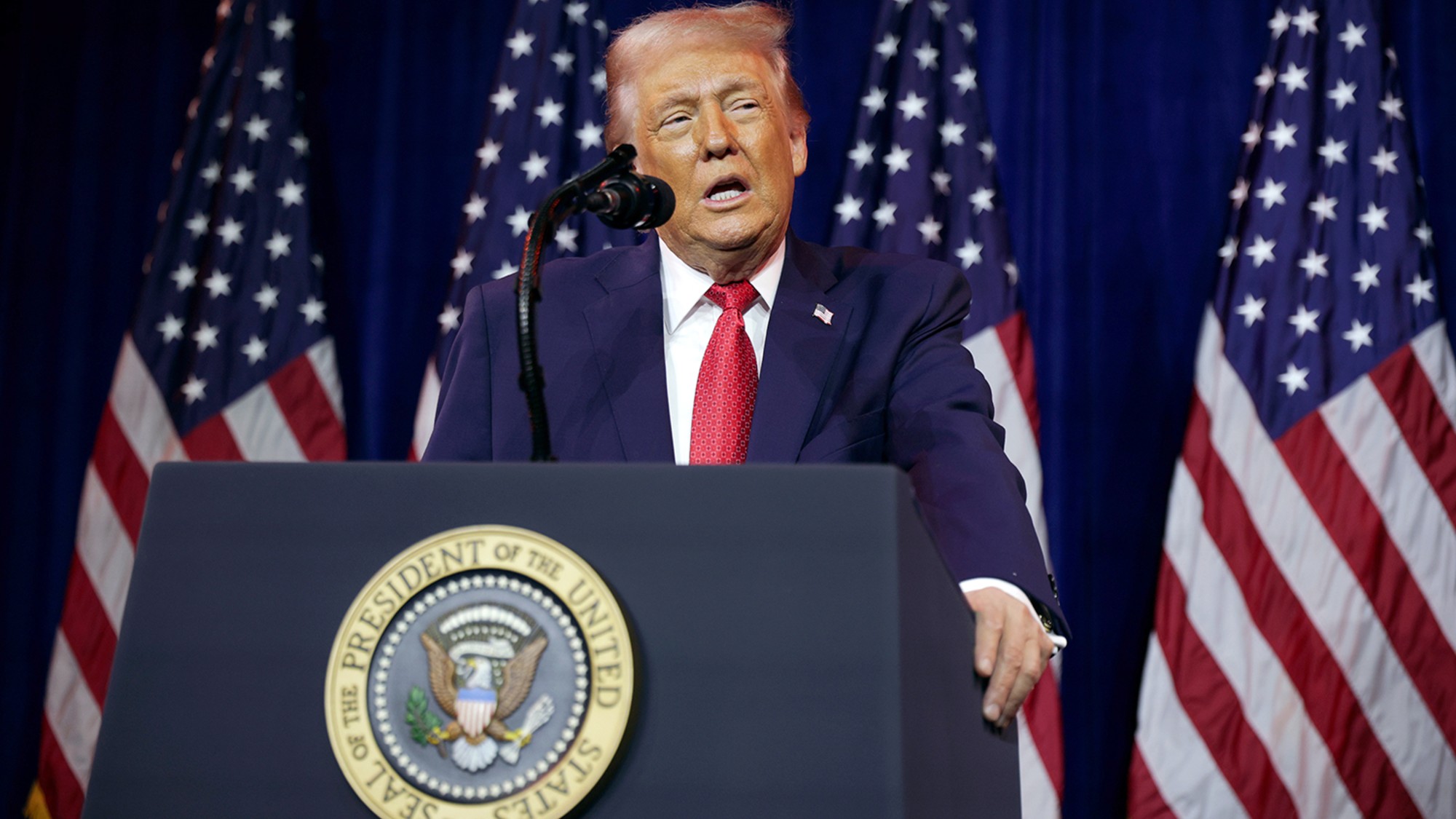Why Trump succumbed to the hawks
The death of the neocons has been greatly exaggerated


I am sure it's just a coincidence that The New York Times announced they'd hired Bret Stephens away from The Wall Street Journal in the same week that the Trump administration's foreign policy underwent a radical reorientation away from an "America First" sensibility and toward the neoconservatism that completely dominates the center-right foreign policy establishment. But that doesn't make it any less disconcerting.
Stephens is a prominent, Pulitzer-Prize-winning neocon pundit who wrote an entire book, in apparent sincerity, about how Barack Obama — who bombed nine countries in his time as president — was pushing "isolationism" and working to bring about American withdrawal from the world. That the Times is eager to add such a strident hawk to its roster of columnists — joining fellow hawks Thomas Friedman, Nicholas Kristof, and David Brooks — is just one more sign that the much-vaunted demise of neoconservatism over the past 18 months has been greatly exaggerated.
The much more consequential sign is, of course, the dramatic shift underway at the White House.
The Week
Escape your echo chamber. Get the facts behind the news, plus analysis from multiple perspectives.

Sign up for The Week's Free Newsletters
From our morning news briefing to a weekly Good News Newsletter, get the best of The Week delivered directly to your inbox.
From our morning news briefing to a weekly Good News Newsletter, get the best of The Week delivered directly to your inbox.
Once dismissed by Trump as "obsolete," NATO is now being expanded to include Montenegro. Instead of a would-be ally, Russia is again being treated as a dangerous rival and opponent. Rather than calling China a currency manipulator, now we're being assured it isn't — and treating the country as a partner in bringing North Korea to heel (which we'll apparently do all on our own if China doesn't play ball). And perhaps most consequential of all, there's Trump's remarkable double backflip on Syria — going from denouncing Obama in 2013 for daring to intervene militarily in Syria at all to denouncing him now for not having intervened enough, and launching several dozen cruise missiles of his own to underline the point.
This is a shocking and, for me at least, dispiriting development. You see, I used to be a neoconservative myself, but I broke ranks over the Iraq War (before it started). Ever since then, I've been waiting for the GOP to abandon its reflexive bellicosity and begin recognizing the foolishness of assuming every problem in the world can be fixed by launching (or threatening to launch) heavy weaponry.
Don't get me wrong: The Democrats, who have their own liberal internationalist variation on hawkishness, often do no better. Obama tried, haltingly, for something slightly smarter. On the one hand, he continued to wage George W. Bush's "war on terror" (rechristened a "fight against violent extremism") in lots of places, but he did so with a much smaller footprint, relying mainly on drone strikes and surgical attacks by special ops. On the other hand, he lapsed into old, bad patterns in Libya, repeating the core mistakes of the Iraq War in miniature.
Obama nonetheless tried to chart a different path, and the foreign policy establishment in both its center-right and center-left variants judged him harshly for it every step of the way — very much including Hillary Clinton's campaign, which made it quite clear that the 2016 Democratic frontrunner longed to revert to old hawkish habits.
A free daily email with the biggest news stories of the day – and the best features from TheWeek.com
That's where Trump came in.
However emotionally unstable and ill-informed his interventions were during the campaign for president, it was hugely salutary to have the leading Republican candidate blasting the Iraq War as a horrible mistake. That he triumphed in the primaries despite — or perhaps even because of — taking this stance significantly broadened the foreign policy debate in the Republican Party and pushed the neocons into a deeper defensive crouch than ever before.
Then, after Trump's implausible win in November, the intensity of neocon opposition during the general election campaign excluded them from top jobs in the incoming administration, which placed an especially high premium on loyalty. For the first time since Reagan's victory in 1980, it looked possible that neoconservatives would exercise no discernable influence on the formulation of a Republican president's foreign policy — a fate, in political terms, worse than death.
No one should be surprised — or perhaps even overly disappointed — that it lasted barely 12 weeks. Trump's ignorance and temperamental recklessness made the prospect of him undertaking significant strategic changes hugely risky — for the United States, for the West, and for the world. And anyway, the resulting Trump-inspired turbulence on the international scene likely would have ended up discrediting the case for military restraint going forward.
Once the "America First" faction in the West Wing started to lose its grip on power, it was probably inevitable that neocon ideas would fill the policy vacuum. There's simply no other game in town on the right side of the spectrum. It's also true that the best of the neocons are at least knowledgeable about the world in a way that the two Stephens (Bannon and Miller) show no signs of being.
Still, it's bewildering to think that all the tumult of the past 18 months may have all been some kind of passing episode that will end up making no lasting difference to the direction of the Republican Party or American foreign policy. You can wound neoconservatism, apparently, but it Just. Won't. Die.
And that might be the most distressing thing of all.
What's especially remarkable about the hawks of both parties is their utter incapacity to learn from experience — or their own mistakes. Instead of inspiring rethinking and even a modicum of humility, the Iraq and Libya debacles have produced exactly … nothing. No reevaluation of strategy. No reflection on the consequences of deposing governments and sowing chaos in countries lacking the cultural, political, and economic prerequisites of liberal democracy.
In this respect, neocons and liberal internationalists are quintessential ideologues, acting in the world on the basis of studiously insulated, unexamined assumptions. They long to rule the world, backed up by force of American arms, and not primarily for rapacious reasons. They genuinely believe that American military hegemony is benign and even a blessing for every well-meaning person on the planet. Defined in this way, resistance in any form stands as evidence of malign intent. What good person, movement, faction, party, or politician could possibly wish to be rid of American guardianship? How could anyone possibly value self-determination more than our selfless offer of benevolent rule?
Until our hawks-for-all-seasons permit their pieties to be challenged and tested by engagement with the rigors and stubborn complications of reality, the mistakes — and consequences of those mistakes — will just keep piling up, with the eventual reckoning delayed (though not forestalled).
There's less chance of such a reckoning now than there was just two weeks ago. Proximity to power has a way of dulling the mind and flattering the ego. But the reckoning will come. Ideas can live, thrive, and command respect in isolation from reality for only so long.
Damon Linker is a senior correspondent at TheWeek.com. He is also a former contributing editor at The New Republic and the author of The Theocons and The Religious Test.
-
 Scoundrels, spies and squires in January TV
Scoundrels, spies and squires in January TVthe week recommends This month’s new releases include ‘The Pitt,’ ‘Industry,’ ‘Ponies’ and ‘A Knight of the Seven Kingdoms’
-
 Venezuela: The ‘Donroe doctrine’ takes shape
Venezuela: The ‘Donroe doctrine’ takes shapeFeature President Trump wants to impose “American dominance”
-
 Giving up the booze
Giving up the boozeFeature Sobriety is not good for the alcohol industry.
-
 The billionaires’ wealth tax: a catastrophe for California?
The billionaires’ wealth tax: a catastrophe for California?Talking Point Peter Thiel and Larry Page preparing to change state residency
-
 Bari Weiss’ ‘60 Minutes’ scandal is about more than one report
Bari Weiss’ ‘60 Minutes’ scandal is about more than one reportIN THE SPOTLIGHT By blocking an approved segment on a controversial prison holding US deportees in El Salvador, the editor-in-chief of CBS News has become the main story
-
 Has Zohran Mamdani shown the Democrats how to win again?
Has Zohran Mamdani shown the Democrats how to win again?Today’s Big Question New York City mayoral election touted as victory for left-wing populists but moderate centrist wins elsewhere present more complex path for Democratic Party
-
 Millions turn out for anti-Trump ‘No Kings’ rallies
Millions turn out for anti-Trump ‘No Kings’ ralliesSpeed Read An estimated 7 million people participated, 2 million more than at the first ‘No Kings’ protest in June
-
 Ghislaine Maxwell: angling for a Trump pardon
Ghislaine Maxwell: angling for a Trump pardonTalking Point Convicted sex trafficker's testimony could shed new light on president's links to Jeffrey Epstein
-
 The last words and final moments of 40 presidents
The last words and final moments of 40 presidentsThe Explainer Some are eloquent quotes worthy of the holders of the highest office in the nation, and others... aren't
-
 The JFK files: the truth at last?
The JFK files: the truth at last?In The Spotlight More than 64,000 previously classified documents relating the 1963 assassination of John F. Kennedy have been released by the Trump administration
-
 'Seriously, not literally': how should the world take Donald Trump?
'Seriously, not literally': how should the world take Donald Trump?Today's big question White House rhetoric and reality look likely to become increasingly blurred
